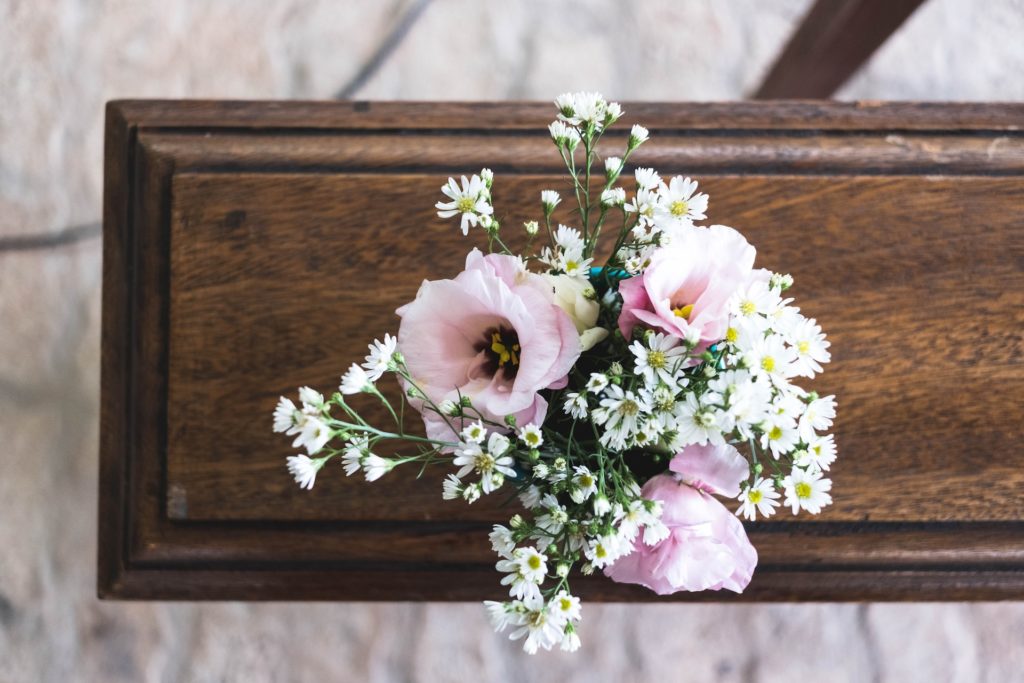With average funeral costs ever-increasing in the US, alternative and more affordable funeral options are becoming more popular. For example, many families are choosing to take on funeral arrangements themselves after a loved one passes away for a much smaller cost, rather than using the services of a professional funeral director who may charge thousands of dollars. This is known as a Do it Yourself, DIY or home funeral. Organizing a funeral service yourself could help you save money for certain, but it can also help you to create a more personal goodbye for your loved one. Traditionally those in later life would look to take out senior life insurance to cover funeral costs, however for many this monthly expense is simply unaffordable during the current economic climate.
In most states, it’s not a legal requirement to use a funeral director and you can arrange a whole funeral yourself if you wish. The states that do require you to use a funeral director for all or part of a funeral are as follows:
- Alabama
- Connecticut
- Illinois
- Iowa
- Indiana
- Louisana
- Michigan
- Nebraska
- New Jersey
- New York#
You can see the specific legislation for each state on the US Funerals Online website, as well as other information on cremation and burial laws in each state.
DIY funeral checklist
Below are the 7 key steps that you may follow for a DIY or home funeral.
- Complete the death certificate
- Care for the deceased at home
- Buy a coffin or shroud
- Book the crematorium or cemetery
- Organise suitable transport
- Arrange the funeral service
- Organise the wake (if you’re having one)
Please note, the information in this article should only be used as a general guide as regulation and processes vary between states.
1. Obtain the death certificate
A death must be registered as soon as possible (how long you have to register the death depends on state law). After your loved one passes away, you’ll need to obtain an official declaration of death so you can register the death and for the death certificate to be issued. A doctor, nurse or other medical professional can help with this if your they passed away in hospital or hospice. If they passed away at home, then you’ll need to call 911 so a paramedic can declare death. Once the death certificate has been issued, you’ll need between 10 – 20 copies as these may be required when handling their affairs, such as accessing bank accounts and claiming life insurance.
2. Care for the deceased at home
In normal cases, a funeral director will be called to collect and bring the deceased into their care until the funeral. For a DIY funeral, the person who has passed can be cared for in the home but only up until about a week. The body will need to be kept as cool as possible, perhaps by using ice packs or air conditioning. If caring for the deceased at home poses any issues, then you may wish to arrange for the body to be kept in a mortuary until the day of the funeral. This could be at the hospital, hospice or funeral home.
3. Buy a coffin or shroud
A coffin (or shroud) can be purchased online by individuals arranging a DIY funeral. However, it may be sensible to check with the crematorium or cemetery first as to which type of coffins they allow. There are hundreds of different types of coffins made from a wide range of materials. If you’re arranging a DIY natural burial then you will need to purchase a coffin made from eco-friendly materials, such as wicker or bamboo. Or you could purchase a shroud which will be made from a biodegradable material such as wool, cotton or silk. Also, to ensure that the coffin (or shroud) is suitable, you’ll need to take into account the height and weight of the person who has passed. The coffin provider may request measurements of the body. Delivery could be arranged to the home or to the company caring for the deceased.
4. Book the crematorium or cemetery
When booking the funeral, you may need to consider the following:
- Whether you have allowed enough time to gather the required paperwork
- If the coffin or shroud has been ordered and will be delivered in time
- Will the florist have the flower arrangements ready
- Has suitable transport been organised
- If holding the service at a different venue, has this been booked
- Who will lead the service and are they available (unless the service is family-led)
- What the deceased will be wearing and whether it is suitable for cremation or burial
- Has an obituary has been arranged
Cremation
To book the crematorium for the cremation you’ll need the death certificate, cremation permit and cremation authorization form (signed by the next of kin). The crematorium may also have their own forms for you to fill in which will provide them with instructions for the funeral and for the ashes. You’ll need to mutually agree on a time and date for the funeral and book in the service at the chapel, unless you’re holding the service at a separate venue, such as at a church. A service usually lasts up to 45 minutes but can be longer at an additional cost.
Other considerations:
- You may wish to purchase an urn for the ashes, as these are usually returned in a simple container
- You may wish to purchase a plot at a cemetery to bury the ashes or you may wish to scatter the ashes at a sentimental location
Burial
For a burial you’ll need the death certificate, burial transit permit and a cemetery deed (if the person purchased a burial plot before they passed away). The cemetery owner can help you arrange the purchase of a lease and help you choose where the burial plot itself should be. You’ll also need to mutually agree on a time and date for the funeral and book in the service at the church, unless you’re holding the service at a separate venue, such as at the cemetery chapel. A service usually lasts up to 45 minutes but can be longer at an additional cost.
Other considerations:
- You’ll need to purchase a memorial to mark the grave (except for natural burial)
5. Organise suitable transport
Transporting the body to where the funeral is taking place will require an estate car or van. If you prefer, a traditional hearse and driver could be hired. This doesn’t need to go through a funeral director. There are alternative hearses available too, for example, a horse-drawn carriage or even a motorcycle (although these may cost a little more). You’ll also need to consider how family members will be getting to and from the service. If you’re on a budget, they could take their own transport or rent a minibus. For a bit more luxury, you could hire a limousine or executive car.
6. Arrange the funeral service
The DIY funeral service could be organised by family members and led by themselves for a truly personalised experience. However, it’s important to stick to an order of service and ensure that the ceremony is wrapped up within 45 minutes (or the amount of time you are booked in for). The other option is to hire a professional, such as a minister or celebrant, to lead the service.
A ceremony may be religious or non-religious and may include:
- Readings/speeches
- Hymns
- Prayers
- Songs
- A eulogy
7. Organise the wake (if you’re having one)
The wake is the less formal part of a funeral and doesn’t have to have a particular structure. You can hold a wake at someone’s home, a town hall or hotel, or social club. Pretty much anywhere you’d like. Just advise your guests where this will be beforehand. You may wish to plan ahead as to what will take place at the wake, for example, if there will be more music, singing and/or other tributes. You may also need to organise food and refreshments for the event.
Pros and cons of a DIY funeral
PROs
- Save money by not using a funeral director (if state law allows)
As mentioned, funeral director services can be expensive. You could save a considerable amount by not using all the traditional services they typically provide.
- Personalisation and privacy
You may feel that using a funeral director is impersonal, particularly if your loved one didn’t have a preference.
A funeral arranged and conducted by close family and friends, who knew the deceased the most, may feel more appropriate.
- Honouring your loved one’s wishes
Your loved one may have instructed family and friends to spend as little as possible on their funeral, or they’d asked in particular for a DIY funeral.
- Free advice is available
Organisations such as The National Home Funeral Alliance provide free advice and guidance on DIY funerals.
CONs
- Need to be physically and mentally prepared
Arranging a funeral yourself may be challenging and stressful whilst you are going through a bereavement.
- Pressure of time
A DIY funeral may require some research and this can be time-consuming (and a little overwhelming). Also, you’ll need to source the necessary products and services and decide how the funeral will be conducted. This may be a task for someone that’s a decision-maker and perhaps knew the deceased very well (or knew their funeral wishes).
- Practical difficulties
The person who has passed needs to be kept in a cool environment up until the funeral. This may be difficult in warmer weather and you’d need to have the space available for up to a week. Also, there may be complications if a coroner needs to be involved, a post-mortem is required, if the person passed away far from home, or if they had passed away in an accident.
- Family and friends need to be available to help
Ensure that you have plenty of support, physically as well as emotionally, throughout the process.
Please note, arranging a funeral yourself can be a challenging task, particularly while you’re grieving the loss of a loved one. Anyone conducting a funeral themselves must follow the same laws and regulations that any professional funeral director is expected to follow. The general guidance is to make sure that you’re physically and mentally prepared to take on this responsibility before getting started. If you need support, The National Home Funeral Alliance provides useful resources for families who are planning a DIY or home funeral.




